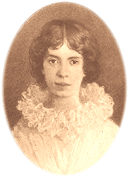Departed Days by Oliver Wendell Holmes (1809-1894)
 picture bykoozeh
picture bykoozeh YES, dear departed, cherished days,
Could Memory's hand restore
Your morning light, your evening rays,
From Time's gray urn once more,
Then might this restless heart be still,
This straining eye might close,
And Hope her fainting pinions fold,
While the fair phantoms rose.
But, like a child in ocean's arms,
We strive against the stream,
Each moment farther from the shore
Where life's young fountains gleam;
Each moment fainter wave the fields,
And wider rolls the sea;
The mist grows dark, -- the sun goes down, --
Day breaks, -- and where are we?




